What do you get when you add a slew of raids, resignations, a federal indictment against a sitting New York City mayor, a presidential election with sweeping ramifications, more than one historic legal battle against said presidential victor, heighted political polarization, the ousting of incumbents and a chaotic rollout of the nation’s congestion pricing program?
Turmoil. That’s perhaps the best way to describe the New York political arc of 2024.
But if New Yorkers are adept at anything in particular, it’s charging forward, resilient. After the mayor cleaned house in wake of his indictment, a handful of veteran New York City leaders were elevated and the Adams administration fought to prove that the federal investigations weren’t a distraction. Despite tall odds, the New York City Council approved a major housing plan, notched some wins against the mayor, and passed some significant legislation. The governor had one of her best legislative years yet. The rate of migrants arriving in the city slowed, and many moved out of the shelter system. Two of the state’s most well-known Republicans further elevated their profiles.
With enthusiasm – and a hint of trepidation – we present City & State’s 2024 Winners & Losers of the Year.
WINNERS
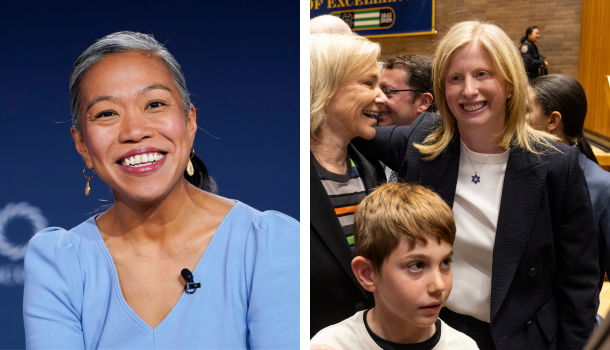
Maria Torres-Springer & Jessica Tisch – It’s not all doom and gloom in City Hall. Amid the hectic slew of departures and resignations after New York City Mayor Eric Adams was indicted in late September, two well-respected women were promoted to vital roles in hopes of bringing stability to the embattled administration.
The first of such elevations, Maria Torres-Springer has garnered wide acclaim since the mayor appointed her first deputy mayor in early October. So much so, a myriad of elected officials, the business community, advocates and government operatives alike all breathed a resounding sigh of relief once news of her promotion broke. The position is a powerful one – second only to the mayor himself. And already, there’s been a lot on Torres-Springer’s plate, such as getting the mayor’s ambitious City of Yes housing zoning plan across the finish line, overseeing internal restructuring, keeping up staff morale and striving to rebuild trust in the scandal-scarred administration. Not to mention she has kept her already hefty deputy mayor for economic development, housing and workforce development portfolio. A well-respected and effective technocrat, Torres-Springer’s elevation to first deputy mayor was seen by many as the natural progression of her career. She has been a major presence across three very different mayoral administrations. Oh, and since we are talking about wins from the whole year, Torres-Springer also played a key role in the mayor coming away with nearly everything he wanted on housing in the state budget.
Torres-Springer is not the only woman in the Adams administration to win during a time where, let’s face it, wins were desperately needed. Jessica Tisch’s interest in leading the New York City Police Department has been no secret – nor was her excitement when the mayor appointed her to the powerful role in late November. While she’s the fourth police commissioner under Adams, she’s the second woman to ever lead the department.
In a sense, leading the NYPD is like coming full circle – albeit in the grandest way possible. While Tisch has never been a police officer, she started her career with the NYPD’s counterterrorism bureau and later, became the department’s deputy commissioner for information technology. Yes, she went on to serve as commissioner of the Department of Information Technology and Telecommunications under then-Mayor Bill de Blasio and most recently led the Sanitation Department, but public safety has remained close to her heart. Let’s also not forget how Tisch took on rats and sought to modernize trash pickup this year. She said it herself: “The rats don’t run this city, we do.” Roughly two years later perhaps the phrase still applies – only this time to herself and Torres-Springer.
– Sahalie Donaldson

Adrienne Adams – Three years ago, the elevation of an unlikely front-runner in the race for New York City Council speaker prompted concerns that the city’s legislative counterweight and oversight authority would be too conciliatory to the incoming mayoral administration.
Adrienne Adams, the council’s consensus speaker pick, was a fellow moderate Democrat from southeastern Queens who represented neighborhoods that made up incoming Mayor Eric Adams’ base, and who personally endorsed Adams for mayor. Would Adrienne Adams dare to be the check on mayoral power that legislators – particularly the more progressive members of the body – wished her to be?
In 2024, Adrienne Adams proved that she can lead the council in being that check, fighting numerous policy and political battles with the mayor’s office that have yielded a mixed bag – but one that includes several unmistakable wins. If political power is an ever-shifting entity, then its pendulum swung plainly to the council’s side of City Hall this year, as the mayor faced plummeting approval ratings and, later in the year, a political crisis stemming from his federal indictment on corruption charges and additional investigations into his inner circle.
In the background, Adrienne Adams led the council to vote to override mayoral vetoes of two public safety and justice-related bills, capitalized on the unpopularity of the mayor’s budget cuts to restore some of those cuts, roundly squashed the mayor’s first nomination for corporation counsel, and, just recently, put the council’s distinctive mark on the mayor’s City of Yes housing plan by tying $5 billion in capital housing commitments from the city and state to the plan’s passage.
Did Adrienne Adams bat a thousand this year? Not exactly. The council’s first attempt to take the Adams administration to court to enforce an expansion of housing vouchers failed. Ballot proposals from the mayor’s Charter Revision Commission largely succeeded despite the council’s brazen campaign against them. And that Charter Revision Commission preempted the speaker’s attempt to subject more mayoral appointees to council approval.
But even with a mixed bag, the speaker has been stubborn on her priorities. From taking steps towards her own Charter Revision Commission to taking on the Adams administration in court again over solitary confinement, Adrienne Adams has proven many of her doubters wrong.
– Annie McDonough
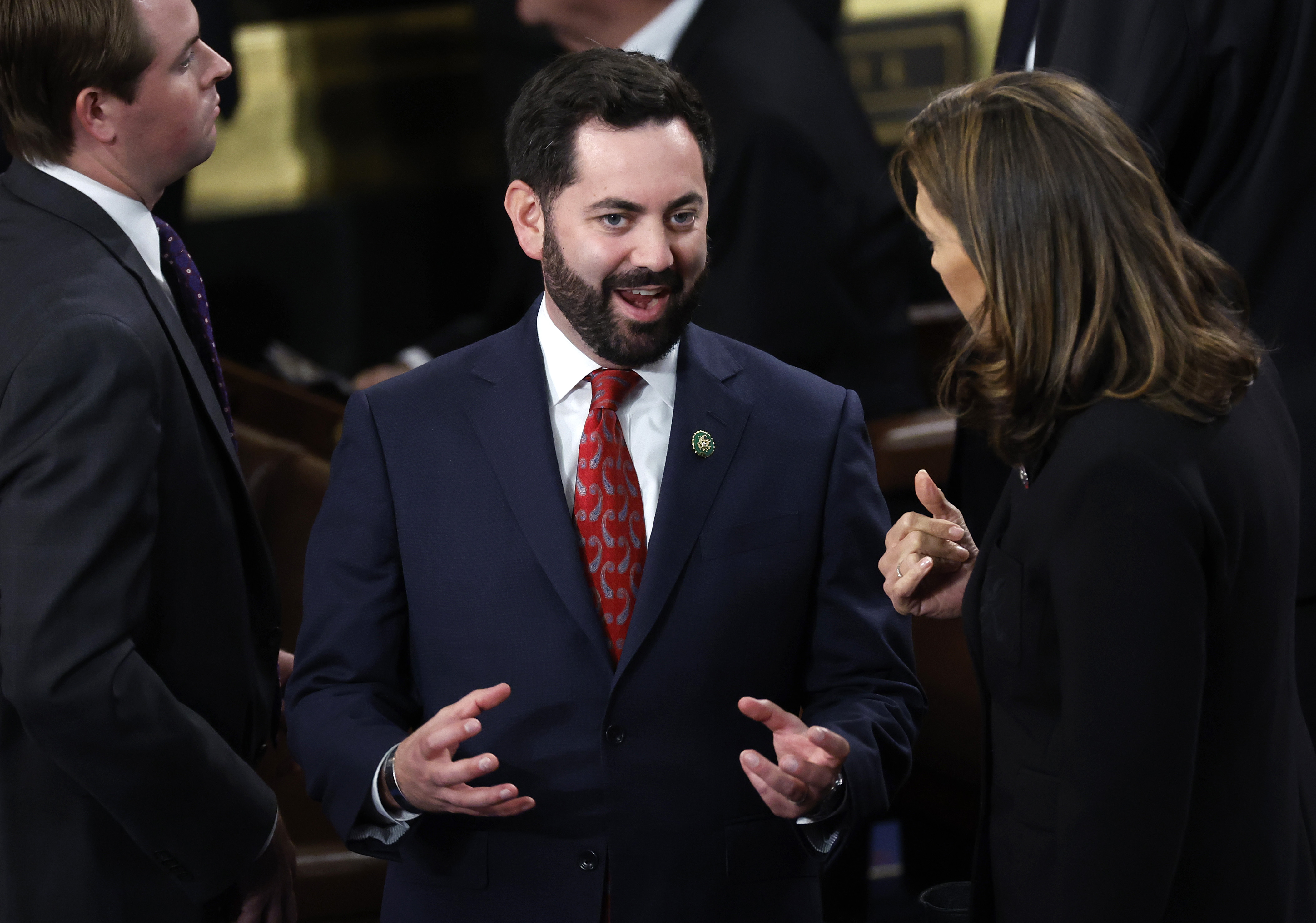
Mike Lawler – It was hard to escape 2024 without seeing Rep. Mike Lawler everywhere. The cable TV darling was victorious in one of the most consequential House races in the nation against former Rep. Mondaire Jones, who has made many missteps. Even though Democrats flipped three House seats in New York, Lawler won by 6 percentage points – showing his electoral strength. He had unions on his side, took money from Elon Musk’s super PAC and won over the Orthodox Jewish community in his district.
The win has catapulted Lawler to the top of the Republican race for governor in 2026. With Hochul’s underperformance in 2022 and the state’s continued rightward trend, a Republican has a good chance of winning the Executive Mansion for the first time in two decades. A majority of voters recently said they want someone else to be governor, a positive sign for the GOP. And if the start of Donald Trump’s second term doesn’t go well, a moderate candidate who has had a standoffish relationship with the president-elect could be an asset against other further right gubernatorial candidates.
He was rated the fourth-most bipartisan House member by the Lugar Center in a report this year. The former political consultant and Assembly member has sponsored one bill that became law, the Enhanced Presidential Security Act of 2024, and co-sponsored eight other successful laws during his time in office. He’s open to working with Democrats next year on repealing the state and local taxes deduction cap and partnered with Democratic Rep. Ritchie Torres on a bill to put antisemitism monitors on college campuses. For the past two years, he has worked with Democratic Rep. Josh Gottheimer of New Jersey (as well as Republicans) to oppose congestion pricing. He was wise enough to warn his fellow Republicans against spreading a racist conspiracy theory about Haitian immigrants, and he hasn’t been afraid to rebuke members of his own party, like Rep. Marjorie Taylor Greene for attempting to oust House Speaker Mike Johnson.
The one major negative for Lawler this year was a New York Times story about photos showing he wore blackface as a college student in 2006. He said it was an “homage” to Michael Jackson and apologized. While the story was in the news cycle for a few days, it hasn’t appeared to harm his gubernatorial chances or long-term political future.
– Eric Holmberg

Elise Stefanik – Some members of Congress toil on committees for years and barely get noticed. That is not the case for Rep. Elise Stefanik, who used her seat on the House Education and the Workforce Committee to position herself as kryptonite for college presidents and now a prominent place in President-elect Donald Trump’s administration.
You would almost expect the song “Another One Bites the Dust” to play whenever Stefanik took her place on the education committee’s dais during hearings on campus protests and antisemitism. The North Country Republican’s sharp questioning helped to bring down three Ivy League presidents. Claudine Gay’s presidency of Stefanik’s alma mater, Harvard University, ended after seven months. Minouche Shafik fled back to London and her seat in the House of Lords after just over a year as Columbia University’s president. Liz Magill lasted 18 months as president of the University of Pennsylvania.
Now that high profile – and her strong support for Trump – has fueled the next stop on Stefanik’s rising career: the United Nations, where Trump is sending her as the United States’ ambassador. Once ensconced in Turtle Bay – with a seat in Trump’s Cabinet – Stefanik will have a global portfolio and the ability to dive into many international issues. She’ll also have an East Side base where she can forge relationships with New York City power brokers who can prove helpful in a future political run.
The U.N. job has proved to be politically potent for a number of former ambassadors. George H.W. Bush’s tenure put him on the path to the presidency; Daniel Patrick Moynihan went from the U.N. to be a U.S. senator from New York for 24 years; Andrew Young was elected mayor of Atlanta; and Henry Cabot Lodge was the 1960 Republican vice presidential nominee.
Stefanik may be leaving the North Country and the nitty-gritty of New York politics for the time being, but that’s just a technicality, because if the past year is any guide, she’ll be bolstering her credentials – and contacts – for another campaign, maybe statewide or maybe for the White House.
– John Celock

Kathy Hochul – It wasn’t a perfect year for Gov. Kathy Hochul, but when is it ever for an executive official? After becoming Rep. Nancy Pelosi’s punching bag for the past two years following Republicans’ overperformance in New York that contributed to the GOP’s control of the House, Hochul got the last laugh (for now). She committed to flipping seats that Democrats lost in 2022 so that New York – and by extension, Hochul – wouldn’t be blamed for Democratic shortcomings in Congress. In the end, the party flipped back four seats last year, three in November and one in a February special election after a highly publicized coordinated campaign that Hochul co-led. She was joined by House Minority Leader Hakeem Jeffries, U.S. Sen. Kirsten Gillibrand and state Democratic Party Chair Jay Jacobs in directing the efforts and associated funds. But make no mistake, this was a big win for Hochul after her own lackluster electoral performance two years ago led to widespread accusations that she was a drag on Democrats down-ballot.
Legislatively, 2024 was also perhaps Hochul’s most successful year. After false starts on attempts to get major housing policy done, the governor reached a compromise with lawmakers to get her agenda moving forward. Hochul and legislative leaders agreed to a high-profile housing deal as part of the state budget. It wasn’t perfect – the governor needed to abandon construction mandates that proved to be a poison pill for the suburbs, replaced with incentives she first announced in 2023 after her housing push failed that year. But following two straight years of inaction on housing, any deal was a victory for the governor on what she had tried to make her marquee issue.
The governor has racked up a win on social media safety for kids, which she made a top issue for her. Other officials state Sen. Andrew Gounardes, Assembly Member Nily Rozic and state Attorney General Letitia James arguably played a larger role in crafting nation-leading legislation. But when the bills to limit addictive algorithmic feeds for minors and protect kids’ data online did get final approval, Hochul was front and center.
Of course, Hochul also repeatedly hit polling lows this year, and she is facing attacks from potential 2026 challengers over her perceived weaknesses, despite what on paper amounted to a good year. Her action on congestion pricing was something of a mixed bag, as she managed to flex her authority to pause it, but gained few new supporters when she instituted it with a lower fee. Plus, she got credit for ordering New York City Mayor Eric Adams to clean house after his federal indictment. So a positive year overall, if not perfect.
– Rebecca C. Lewis
LOSERS
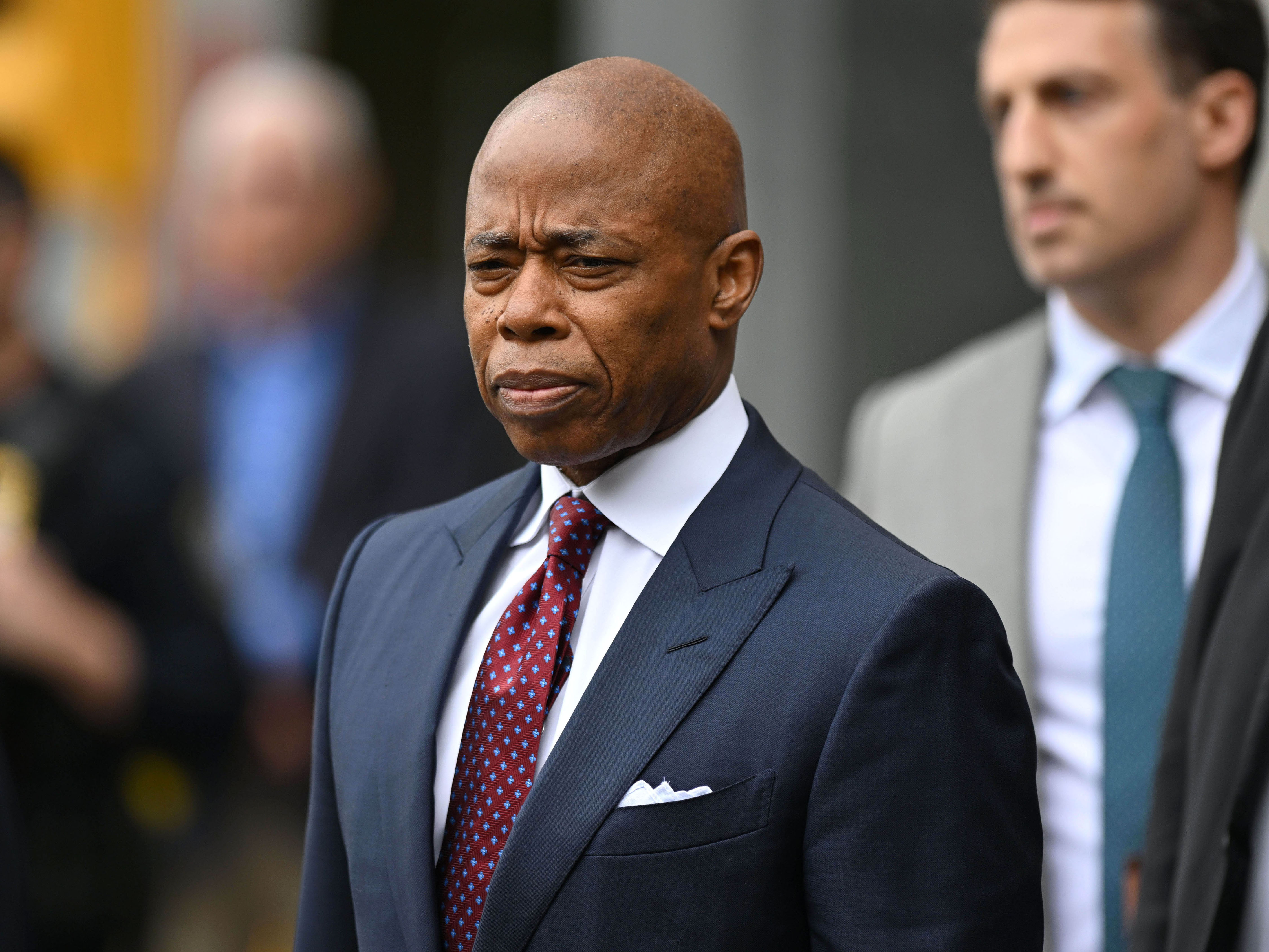
Eric Adams – “I always knew that if I stood my ground for all of you, I would be a target,” New York City Mayor Eric Adams said after he found out he was going to be the first mayor in modern city history to be indicted. “And a target I became.” In September, U.S. Attorney for the Southern District of New York Damian Williams unsealed a stunning five-count indictment alleging that the mayor illegally funneled foreign donations to his 2021 campaign and accepted bribes from Turkish nationals in exchange for favors. Multiple other corruption investigations are reportedly underway at all levels of government, and federal prosecutors suggested that there might be more charges. Adams stridently denied wrongdoing, but by October, a damning Marist poll found that 69% of New Yorkers thought the mayor should step down. (That followed pre-indictment polling that found Adams’ approval rating hit record lows.) Dozens of elected officials across the ideological spectrum publicly called for his resignation. For several chaotic weeks, many of Adams’ closest advisers resigned or were pushed out, and it wasn’t at all clear that he could right the ship. Multiple credible challengers have launched mayoral campaigns to unseat Adams, and rumors circulated that former Gov. Andrew Cuomo and state Attorney General Letitia James were waiting in the wings.
So, of course he lost a lot this year. However, the mayor notched some major wins in 2024. More than almost anyone else in New York City, he seems poised to benefit from the incoming Donald Trump administration. Trump and Adams have already commiserated about being the targets of federal law enforcement. As the Trump transition proceeds, Williams is headed for the exits, while Arthur Aidala, an ally of Adams’ top adviser, is on the short list to head up the U.S. Attorney’s Office for the Eastern District of New York. This year, Adams also got most of what he wanted from the state legislative session, including renewed tax incentives for real estate developers and a crackdown on illegal weed stores. All but one of the ballot proposals written by the Charter Revision Commission he convened passed, indirectly defeating a City Council attempt to expand their authority over his administration’s appointments. And whether he actually did the heavy lifting or not, the mayor gets to take credit for the City of Yes housing plan, which promises to clear the way for tens of thousands of additional housing units to be built in the coming years. Plus, the mayor locked his phone before he turned it over to federal investigators, and he conveniently “forgot” his password. A personal win since, as far as we know, the feds still haven’t been able to break into the device.
– Holly Pretsky
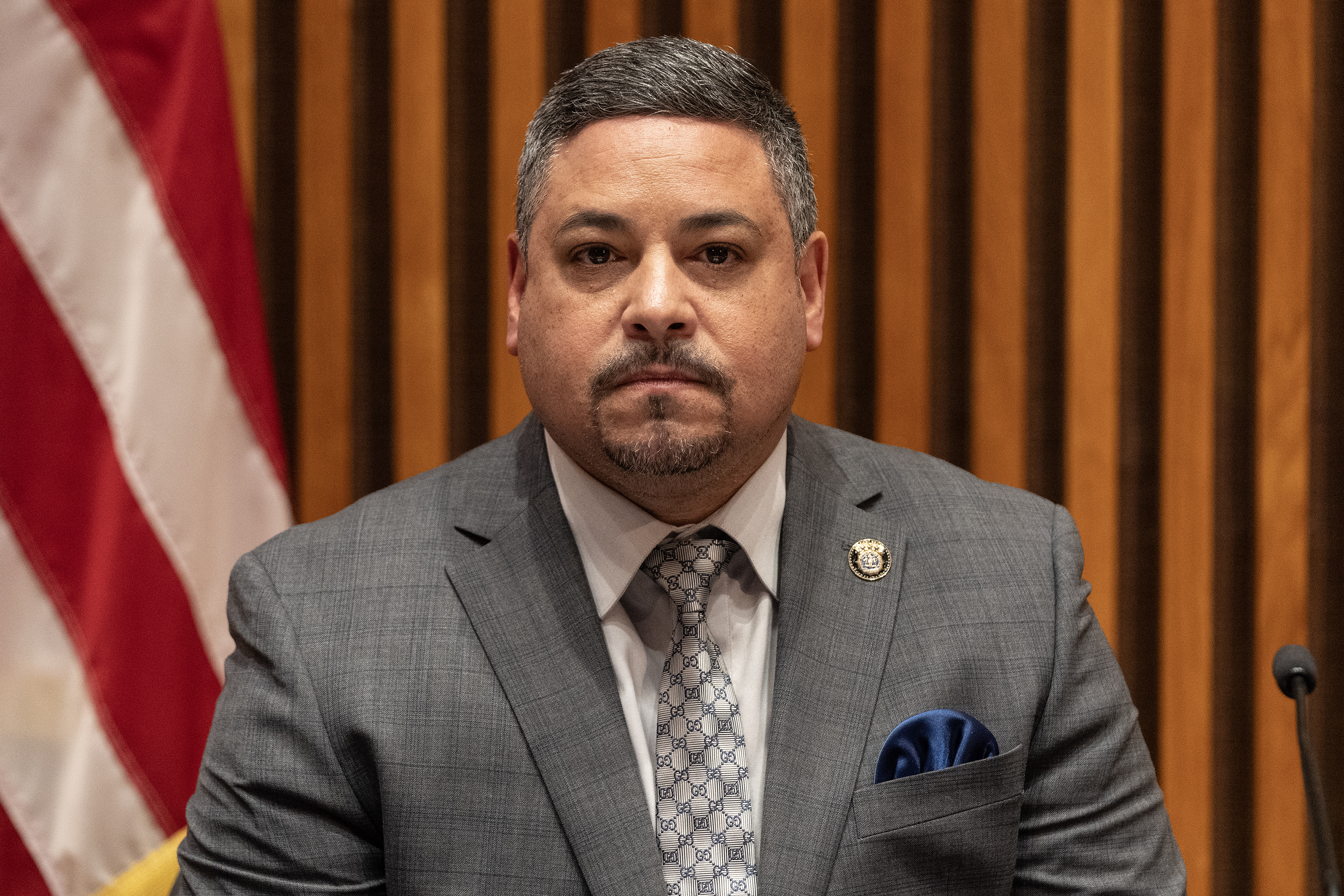
The Raided and Resigned – This fall, it felt as if New Yorkers could fill out a bingo card with the number of Adams administration officials who found themselves in the orbit of one federal investigation or another – including New York City Mayor Eric Adams himself. It became so difficult to keep track of them that City & State created two trackers to follow Adams administration officials under investigation. While both lists are extensive, we decided that those who were subject to raids and resigned from their posts were ultimately the biggest losers: Ex-New York City schools Chancellor David Banks, former First Deputy Mayor Sheena Wright, former Deputy Mayor for Public Safety Phil Banks III, former New York City Police Department Commissioner Edward Caban, former Senior Adviser Tim Pearson and ex-Director of Asian Affairs Winnie Greco. But those implicated in an unprecedented web of mayoral scandals extended beyond the Adams administration itself: Terence Banks, brother to David and Phil Banks, and James Caban, Edward Caban’s twin brother, also found themselves part of these federal investigations. The U.S. Attorney’s Office for the Southern District of New York appeared this fall to be investigating whether James Caban, a nightclub consultant and former cop himself, profited from his brother’s post in the NYPD. And things weren’t so hot for the Banks brothers either, as the SDNY also looked into a potential bribery scheme implicating Terence Banks’ consulting group and how the city awarded various contracts to his clients. Of course, with the beginning of a new presidential administration in Washington, D.C., next month and expected turnover at the U.S. Department of Justice, many of the reported inquiries involving the raided and resigned could go up in smoke. But for them, the reputational damage has already been done – even if any of those mentioned here are not ultimately indicted or mentioned in any future indictments, their careers and reputations could be tarnished forever. All the while, the mayor could be one of the few to make it through the storm.
– Sophie Krichevsky
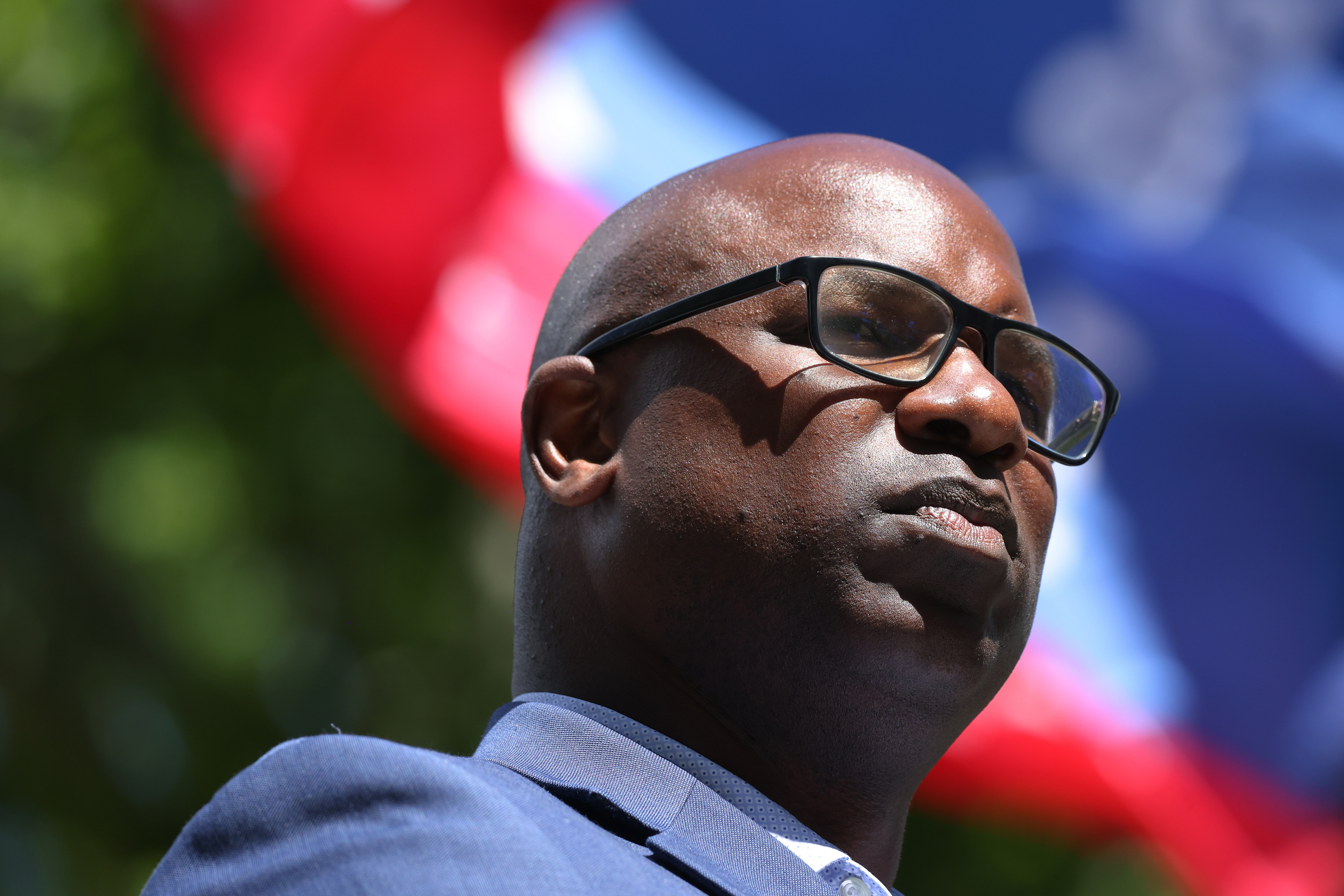
Jamaal Bowman – This year was a five-alarm fire for Rep. Jamaal Bowman, as a combination of redistricting and anger over his opposition to the war in Gaza – and yes, his inexplicable decision to pull a fire alarm in the U.S. Capitol – severely weakened him as a candidate. Throw in a strong challenger with decades of experience in local politics, backed by tens of millions of dollars in outside contributions, and the progressive member of “the Squad” never had a chance.
It was an ignominious defeat and new obstacle in Bowman’s political career, which had begun with such promise in 2020. Just two years after progressive standard-bearer Rep. Alexandria Ocasio-Cortez toppled a powerful incumbent, Bowman bested longtime incumbent Rep. Eliot Engel to become the first Black person to represent Westchester County in Congress. A former middle school principal from the Bronx, Bowman spoke in raw and passionate terms with a message that appealed to Black communities in cities like Yonkers and to liberal white suburbanites who proudly proclaimed that “Black Lives Matter.”
Bowman’s ability to knit together this multiracial coalition even led to speculation about a run for even higher office – could he move back to the Bronx and run for New York City mayor? – until everything came crashing down a year ago. Bowman joined his far-left comrades in voting against President Joe Biden’s Inflation Reduction Act, not because he opposed the infrastructure funding but to protest its omission of critical social welfare spending. He infamously activated a fire alarm and delayed a government shutdown vote, supposedly because he thought it was the only way to open a locked door, which earned him a House censure. And when Israeli troops invaded Gaza following Hamas’ Oct. 7 attack, Bowman became one of the loudest voices in Congress demanding a ceasefire and condemning Israel’s “genocide” in Palestine.
Bowman’s pro-Israel Jewish constituents lost trust in him, and Westchester County Executive George Latimer, a beloved local politician, launched a primary challenge that occasionally turned nasty. Latimer, a 71-year-old white man, made inartful comments about race and accused Bowman of supporting Hamas, while Bowman traded in the (relatively) buttoned-up and unthreatening political persona that had helped him win over white suburbanites in 2020 for a more confrontational style that spoke directly to his base. But Bowman’s support from the Working Families Party and a last-minute endorsement from the Democratic Socialists of America couldn’t overcome Latimer’s near-universal popularity in the district’s whiter suburbs, or the tens of millions of dollars that outside groups like AIPAC spent to back Latimer – which made the race the most expensive Democratic congressional primary in the country.
– Peter Sterne
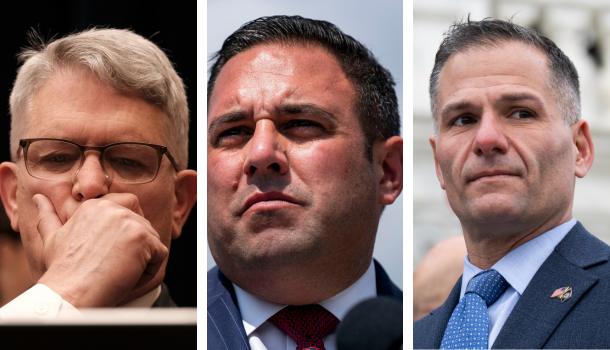
Brandon Williams & Anthony D’Esposito & Marc Molinaro – Republicans have enjoyed several “red waves” in New York, starting in 2021. Reps. Brandon Williams, Anthony D’Esposito and Marc Molinaro all entered office during one of those wave years in 2022. On paper, 2024 was another red wave as Republicans won the White House (including every swing state), kept the House and flipped the U.S. Senate. Even in New York, Donald Trump performed better than ever.
And yet, none of these three Republican members of Congress benefited from any of that momentum and didn’t survive to a second term. Up near Syracuse, Williams was perhaps the biggest GOP loser from redistricting. The 22nd Congressional District became much more friendly to Democrats, so much so that state Sen. John Mannion’s victory could almost have been seen as a forgone conclusion. It certainly didn’t help that House Speaker Mike Johnson said he would repeal one of Central New York’s most important recent economic drivers days before the election.
In the Hudson Valley and the Southern Tier, Molinaro took a gamble with a rightward shift in his rhetoric. Most notably, he parroted a racist conspiracy theory about Haitian migrants that not even his fellow New York Republicans got on board with. After a long history in public office, Molinaro’s political future is now murky, especially as his moderate image has taken a blow.
On Long Island, D’Esposito’s loss may sting particularly badly. Trump won Nassau County, which was the first time a Republican had won the county since Ronald Reagan, and he even held a big rally in D’Esposito’s district prior to the election. But come Election Day, that didn’t translate to a second term. The race got messy for D’Esposito, as The New York Times reported on an alleged affair and potentially unethical hiring practices involving both his mistress and his fiancée’s daughter. He brushed off the reporting, but coverage of the story did suck up much of the air at the end of a tight election.
So far, none of the trio have been seriously considered for a Trump administration position, even as the president-elect dips into the New York talent pool. Trump has plenty of positions left to fill and may yet have jobs for the soon-to-be unemployed party faithful, so a soft landing after a tough election cycle certainly can’t be ruled out.
– Rebecca C. Lewis

Iwen Chu & Peter Abbate Jr. – What’s more New York politics than intraparty fighting, petty one-upsmanship and tabloid mudslinging?
One of the most potent sources of that age-old dynamic in New York is quickly decaying, as ex-Assembly Member Peter Abbate Jr.’s southern Brooklyn political cohort disappears – giving freer rein, and little pushback, to rival Assembly Member Bill Colton’s cohort.
Abbate, a 36-year veteran of the state Legislature, was ousted in 2022 in a major upset by Republican Lester Chang. But some thought Abbate – with his hefty war chest, name recognition and years of work in the district – had a decent shot at reclaiming his old seat this year. Whether or not that would prove true, Abbate didn’t get the chance to find out, as he got kicked off the ballot for invalid petition signatures in the spring. Abbate railed against his rivals – Colton and his protégé, New York Council Member Susan Zhuang, Chang and Brooklyn Democratic Party Chair Rodneyse Bichotte Hermelyn – and spent campaign cash that, in another world, might have gone to fliers with his name and face on them, on ones targeting his political enemies.
But Abbate losing a chance at his own reelection isn’t what makes him a joint loser of the year. State Sen. Iwen Chu – a former staffer and bona fide member of the Abbate cohort – lost reelection to Republican Steve Chan, which cost Senate Democrats their supermajority in Albany. Chu didn’t win election in 2022 by a very wide margin, but increasing shifts to the right among Asian voters in southern Brooklyn – along with a bitter fight over a local homeless shelter – caught up with Chu this time, making her a one-term member and picking off another member of Team Abbate.
With Justin Brannan – another Abbate ally and Bichotte Hermelyn critic – term-limited and on his way out of office in Brooklyn, the Abbate cohort could be at risk of extinction. This, as Colton allies like Zhuang seem to be on the rise.
One potential bright spot for any political observers who aren’t quite ready to say goodbye to this particular rivalry; if Abbate’s spending on attack mailers is any indication, he’s not staying out of the feud. Unfortunately for him – and Chu, if she chooses – they’re relegated to weighing in from the sidelines, for now.
– Annie McDonough
NEXT STORY: This week’s biggest Winners & Losers


